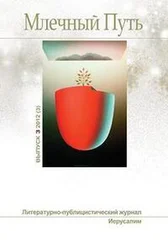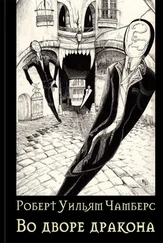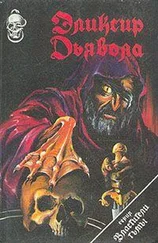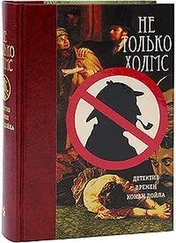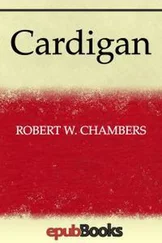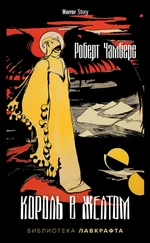"I thank you from the bottom of my heart!" I cried; "—from the depths of a heart the emotions of which are entirely and exclusively of scientific origin!"
In the impulse of the moment I held out my hand; she laid hers in it with charming diffidence.
"Yours is the discovery," I said. "Yours shall be the glory. Fame shall crown you; and perhaps if there remains any reflected light in the form of a by–product, some modest and negligible little ray may chance to illuminate me."
Surprised and deeply moved by my eloquence, I bent over her hand and saluted it with my lips.
She thanked me. Her pretty face was rosy.
It appeared that she had three cows to milk, new–laid eggs to gather, and the construction of some fresh butter to be accomplished.
At the bars of the grassy pasture slope she dropped me a curtsey, declining very shyly to let me carry her lacteal paraphernalia.
So I continued on to the bungalow garden, where Blythe sat on a camp stool under a green umbrella, painting a picture of something or other.
"Mr. Blythe!" I cried, striving to subdue my enthusiasm. "The eyes of the scientific world are now open upon this house! The searchlight of Fame is about to be turned upon you—"
"I prefer privacy," he interrupted. "That's why I came here. I'll be obliged if you'll turn off that searchlight."
"But, my dear Mr. Blythe—"
"I want to be let alone," he repeated irritably. "I came out here to paint and to enjoy privately my own paintings."
If what stood on his easel was a sample of his pictures, nobody was likely to share his enjoyment.
"Your work," said I, politely, "is—is―"
"Is what!" he snapped. " What is it—if you think you know?"
"It is entirely, so to speak, per se —by itself—"
"What the devil do you mean by that?"
I looked at his picture, appalled. The entire canvas was one monotonous vermillion conflagration. I examined it with my head on one side, then on the other side; I made a funnel with both hands and peered intently through it at the picture. A menacing murmuring sound came from him.
"Satisfying—exquisitely satisfying," I concluded. "I have often seen such sunsets—"
"What!"
"I mean such prairie fires—"
"Damnation!" he exclaimed. "I'm painting a bowl of nasturtiums!"
"I was speaking purely in metaphor," said I with a sickly smile. "To me a nasturtium by the river brink is more than a simple flower. It is a broader, grander, more magnificent, more stupendous symbol. It may mean anything, everything—such as sunsets and conflagrations and Götterdämmerungs! Or—" and my voice was subtly modulated to an appealing and persuasive softness—"it may mean nothing at all—chaos, void, vacuum, negation, the exquisite annihilation of what has never even existed."
He glared at me over his shoulder. If he was infected by Cubist tendencies he evidently had not understood what I said.
"If you won't talk about my pictures I don't mind your investigating this district," he grunted, dabbing at his palette and plastering a wad of vermilion upon his canvas; "but I object to any public invasion of my artistic privacy until I am ready for it."
"When will that be?"
He pointed with one vermilion–soaked brush toward a long, low, log building.
"In that structure," he said, "are packed one thousand and ninety–five paintings—all signed by me. I have executed one or two every day since I came here. When I have painted exactly ten thousand pictures, no more, no less, I shall erect here a gallery large enough to contain them all.
"Only real lovers of art will ever come here to study them. It is five hundred miles from the railroad. Therefore, I shall never have to endure the praises of the dilettante, the patronage of the idler, the vapid rhapsodies of the vulgar. Only those who understand will care to make the pilgrimage."
He waved his brushes at me:
"The conservation of national resources is all well enough—the setting aside of timber reserves, game preserves, bird refuges, all these projects are very good in a way. But I have dedicated this wilderness as a last and only refuge in all the world for true Art! Because true Art, except for my pictures, is, I believe, now practically extinct!…You're in my way. Would you mind getting out?"
I had sidled around between him and his bowl of nasturtiums, and I hastily stepped aside. He squinted at the flowers, mixed up a flamboyant mess of colour on his palette, and daubed away with unfeigned satisfaction, no longer noticing me until I started to go. Then:
"What is it you're here for, anyway?" he demanded abruptly. I said with dignity:
"I am here to investigate those huge rings of earth thrown up in the forest as by a gigantic mole." He continued to paint for a few moments:
"Well, go and investigate 'em," he snapped. "I'm not infatuated with your society."
"What do you think they are?" I asked, mildly ignoring his wretched manners.
"I don't know and I don't care, except, that sometimes when I begin to paint several trees, the very trees I'm painting are suddenly heaved up and tilted in every direction, and all my work goes for nothing. That makes me mad! Otherwise, the matter has no interest for me."
"But what in the world could cause—"
"I don't know and I don't care!" he shouted, waving palette and brushes angrily. "Maybe it's an army of moles working all together under the ground; maybe it's some species of circular earthquake. I don't know! I don't care! But it annoys me. And if you can devise any scientific means to stop it, I'll be much obliged to you. Otherwise, to be perfectly frank, you bore me."
"The mission of Science," said I solemnly, "is to alleviate the inconveniences of mundane existence. Science, therefore, shall extend a helping hand to her frailer sister, Art—"
"Science can't patronize Art while I'm around!" he retorted. "I won't have it!"
"But, my dear Mr. Blythe—"
"I won't dispute with you, either! I don't like to dispute!" he shouted. "Don't try to make me. Don't attempt to inveigle me into discussion! I know all I want to know. I don't want to know anything you want me to know, either!"
I looked at the old pig in haughty silence, nauseated by his conceit.
After he had plastered a few more tubes of vermilion over his canvas he quieted down, and presently gave me an oblique glance over his shoulder.
"Well," he said, "what else are you intending to investigate?"
"Those little animals that live in the crater fires," I said bluntly.
"Yes," he nodded, indifferently, "there are creatures which live somewhere in the fires of that crater."
"Do you realize what an astounding statement you are making?" I asked.
"It doesn't astound me . What do I care whether it astounds you or anybody else? Nothing interests me except Art."
"But—"
"I tell you nothing interests me except Art!" he yelled. "Don't dispute it! Don't answer me! Don't irritate me! I don't care whether anything lives in the fire or not! Let it live there!"
"But have you actually seen live creatures in the flames?"
"Plenty! Plenty! What of it? What about it? Let 'em live there, for all I care. I've painted pictures of 'em, too. That's all that interests me."
"What do they look like, Mr. Blythe?"
"Look like? I don't know! They look like weasels or rats or bats or cats or—stop asking me questions! It irritates me! It depresses me! Don't ask any more! Why don't you go in to lunch? And—tell my daughter to bring me a bowl of salad out here. I've no time to stuff myself. Some people have. I haven't. You'd better go in to lunch…. And tell my daughter to bring me seven tubes of Chinese vermilion with my salad!"
"You don't mean to mix—" I began, then checked myself before his fury.
Читать дальше

